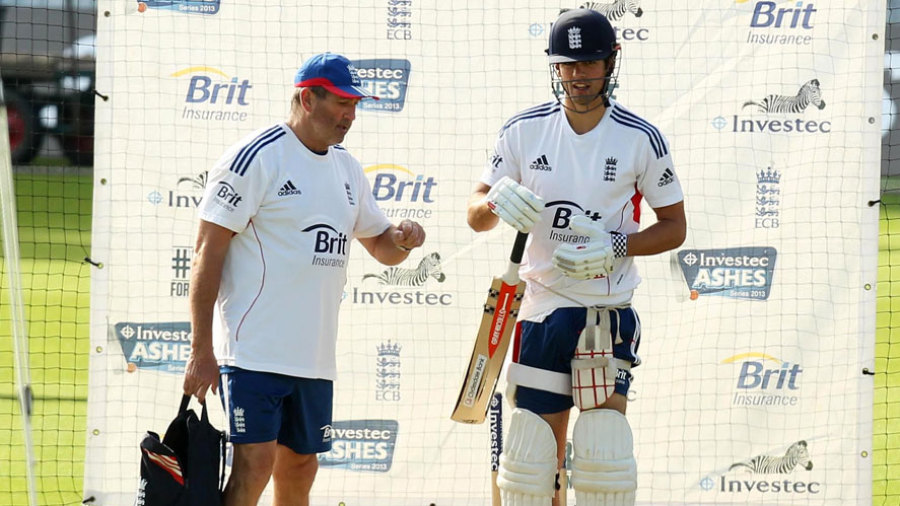Bubba Watson won the Masters golf tournament on Sunday, taking his second green jacket in three years. While he isn't quite in the league of Jack Nicklaus and Tiger Woods, Watson is - as those two did before him - playing a game with which the rest of golf is unfamiliar; at least at the Augusta National. The distance he hits the ball (with a pink driver) and the extraordinary spins that he applies in order to shape his shots through the air, mean that he attacks the famous course entirely differently to everyone else. He has never had a coach, and what's more he's never had a lesson, which makes him rare among high-end golfers (and most hackers) - it is after all the sport that authored the phrase "paralysis by analysis".
Nicklaus himself was reflecting on this during a commentary stint, and he recalled his own coach, a man named Jack Grout, who would speak to him twice a year, usually in a couple of clipped sentences. "His whole philosophy," Nicklaus said, "was to enable me to correct my own mistakes on the golf course."
One of sport's great archetypes is the aged and taciturn coach, the kind of man who will watch silently for half an hour and then impart, often via a single and devastating sentence, a thought that changes not just how you play the game, but how you see it. When John Jacobs, a golf coach who has been working for 60 years and who is possibly the most influential instructor in the sport, sat down to write his first book, he said: "I remember that the first thing I wrote down on paper was, 'Golf is what the ball does.' That was my breakthrough as a teacher. I look at what the ball's doing, and then I ask, 'Why?'"
Jacobs had distilled his philosophy down to one thought: you can learn everything you need to know about a player's swing by watching what the ball does once it has been struck. It's fantastically obvious and wonderfully true, and it applies equally well to cricket. All that matters is that moment when bat meets ball. You could discover how to coach anything by talking to John Jacobs.
He came to mind this weekend not just during the Masters, but when I read Neil Burns' angry and telling excoriation of cricket coaching in England on this site (and a somewhat terrifying first-person account from Rupert Williams, the father of a county triallist subjected to some sort of intensive PE course reinforced with nonsensical slogans and punishment press-ups).
Burns' piece should be taken as a whole, but there were some key threads. One was: The "teach yourself about yourself" philosophy still speaks loudly to all who aspire to become top performers - or as Nicklaus' coach had it all of those years ago, "being able to correct your own mistakes". Then there was a wider notion of: "More art, less science" - or as Jacobs put it, "Golf is what the ball does."
Burns likens the expansion of sports science and the growth of the "support systems" around international teams, counties and franchises to the cult of the manager in football, a valid comparison. There is one worth drawing with golf too. David Leadbetter's success with Nick Faldo, and Butch Harmon's with Woods, led indirectly to the development of a mini-industry of swing gurus, mind coaches, short-game experts and other potential saviours, an ecosystem that feeds on itself, producing endless ways to reframe old knowledge in new language.
From there it is a short step to the cycling coach Dave Brailsford's school of "marginal gains", where everything from the quality of bikes to the togs on the cyclists' duvets are micro-managed. None of these things are intrinsically wrong, but they depend on an ever-increasing complexity to survive. And then along comes a Usain Bolt or a Bubba Watson or a Virender Sehwag and the goalposts move again…
Golf, like any other sport, has its manufactured players. Faldo's partnership with Leadbetter made legends of them both, and Woods has undergone three major swing overhauls (in truth as much to lessen the damage to his body as to change his method), the most important of those with Harmon. It's easy to see a future in which superstar freelance batsmen discard the wider team coaching systems and use similar relationships - indeed, they already exist: Kevin Pietersen and Graham Ford, Alastair Cook and Graham Gooch; even Sachin Tendulkar and his brother Ajit, with whom he'd discuss each innings (and according to Sachin, sometimes each shot…).
Ultimately, sports like golf and cricket are games of skill. They are as much about art as science. Talent will out, and it cannot be controlled, only channelled. Any idiot can get fit. Not many people can bowl like Murali. That may not be an entirely appetising lesson for the coaching industry but it's one that must be absorbed, as Neil Burns points out.

No comments:
Post a Comment